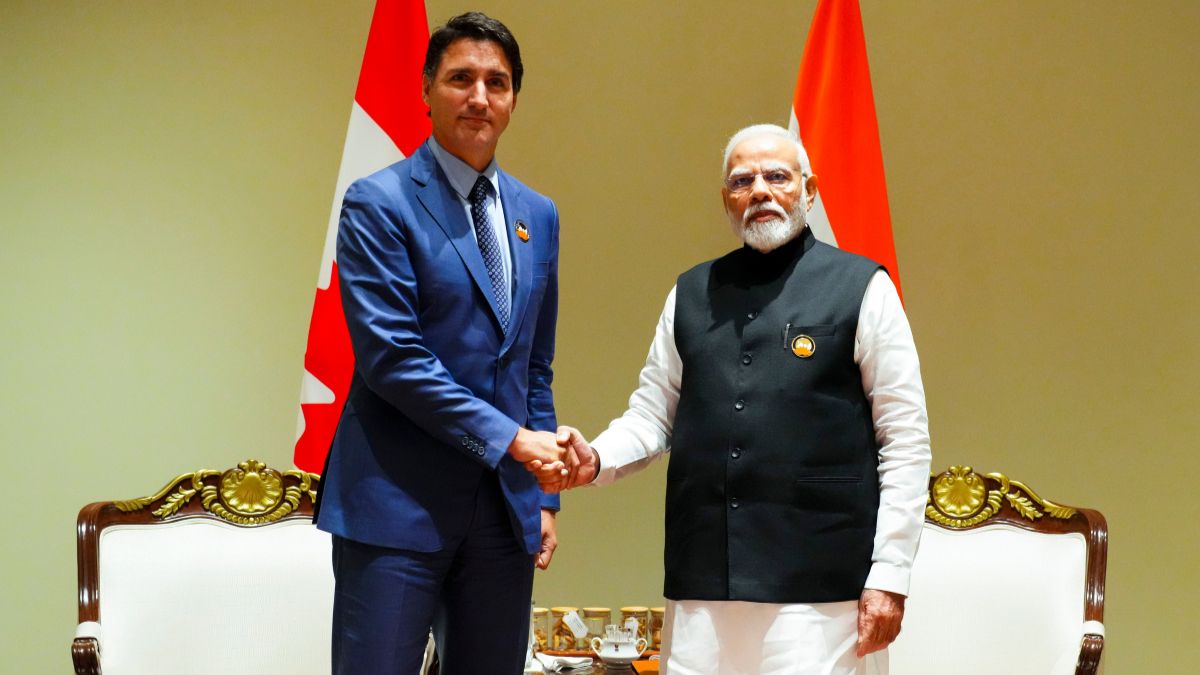According to the MEA statement Canadian Prime Minister Justin Trudeau’s visit to India in 2018 was aimed at currying favour with a vote bank, rebounded to his discomfort and individuals in his Cabinet included ones who serves the anti-India separatist agenda
In a strongly worded rejection of Canada’s allegation that Indian envoy to the country, Sanjay Verma, is a ‘person of interest’ in the murder case of Khalistani separatist Hardeep Nijjar, India on Monday linked it to Canadian Prime Minister Justin Trudeau’s falling political fortunes. India’s external affairs ministry (MEA) said it was a “vote bank” politics of Trudeau that was affecting its diplomatic relations with India.
“Prime Minister Trudeau’s hostility to India has long been in evidence. In 2018, his visit to India, which was aimed at currying favour with a vote bank, rebounded to his discomfort. His Cabinet has included individuals who have openly associated with an extremist and separatist agenda regarding India,” the MEA statement said.
“His naked interference in Indian internal politics in December 2020 showed how far he was willing to go in this regard. That his government was dependent on a political party, whose leader openly espouses a separatist ideology vis-à-vis India, only aggravated matters,” India said.
“Under criticism for turning a blind eye to foreign interference in Canadian politics, his government has deliberately brought in India in an attempt to mitigate the damage. This latest development targeting Indian diplomats is now the next step in that direction,” New Delhi’s statement read.
India further said, “It is no coincidence that it takes place as Prime Minister Trudeau is to depose before a Commission on foreign interference. It also serves the anti-India separatist agenda that the Trudeau government has constantly pandered to for narrow political gains.”
Impact Shorts
More ShortsTrudeau has had a difficult relationship with India, especially as his political fate got more and more dependent on Sikh-dominated party, New Democratic Party of Jagmeet Singh, who recently withdrew support to the Trudeau government.
However, it may not be out of place to refer to his father Pierre Trudeau’s India policy, which contributed to the growth of Khalistani separatist elements in Canada during the 1970s and 1980s.
Pierre Trudeau was Canada’s 15th prime minister — from 1968 to 1979, and again from 1980 to 1984. Both Pierre and his son Justin Trudeau have had strained relationships with India, largely due to their stance on the Khalistan separatist campaign. While Pierre Trudeau’s era witnessed early signs of these tensions, Justin Trudeau’s approach has fuelled them further, leading to a significant deterioration in Indo-Canadian relations.
Pierre Trudeau’s period began on good note, ended badly
The years of the 1970s were those of rapidly changing geopolitical equations and calculations. In the Indian subcontinent, a new nation, Bangladesh had come up, with the breaking up of Pakistan. Pierre Trudeau visited India in 1971 — his Taj Mahal tour making pictorial headlines all over the world.
On a deeper level, India and Canada were cooperating for nuclear energy generation. But when India went for a nuclear test in 1974, Trudeau turned the tables completely and took an anti-India stance. By that time, he was already backing Khalistani elements.
Pierre Trudeau’s Canada was witnessing a growing Sikh population, becoming a refuge for several Khalistani militants. As the head of the government, Pierre Trudeau resisted India’s requests to extradite known terrorists, particularly Talwinder Singh Parmar.
His policy of siding with militant separatists from India is widely believed to have led to the bombing of Air India Flight 182 —the Kanishka bombing— in 1985. Talwinder Parmar was identified as the mastermind of the Kanishka bombing, killing 329 people — mostly Canadians of Indian origin. It remains the deadliest act of terrorism in Canada’s history.
While Talwinder Singh Parmar, who orchestrated the bombing, was eventually killed in Punjab in 1992 by the police, the episode deeply damaged Indo-Canadian ties.
How Justin Trudeau dealt with the issue
Justin Trudeau’s tenure has seen a continuation of the problematic legacy of Khalistani extremism in Canada. His handling of the issue has led to accusations of harbouring anti-India elements and allowing the Khalistani movement to resurface within Canadian borders.
Justin Trudeau’s long reliance on political support from Jagmeet Singh, a politician who sympathises with the Khalistani cause, is understood to be shaping his soft stance on the issue. Sikhs are an influential voting bloc in Canada — and a factor behind Trudeau prioritising domestic politics over international relations with India, as the MEA statement stated today.
During his 2018 India visit, a known Khalistani extremist was invited to a Canadian diplomatic event, drawing strong reactions from India. Trudeau denied direct involvement in the invite but the damage had been done. The visit turned out to be a diplomatic failure.
Following the killing of Nijjar in 2023 — in a suspected gang war, according to India, and an intelligence plot, according to the Canadian government — Trudeau once again stoked tensions. Speaking in the Canadian parliament, Trudeau accused India of being involved in the killing of Nijjar, who was a designated Khalistani terrorist, in Canada’s British Columbia province.
The two sides have traded charges over the issue, with bilateral ties worsening as every new row has proved to be bitter than the previous one.


)

)
)
)
)
)
)
)
)



